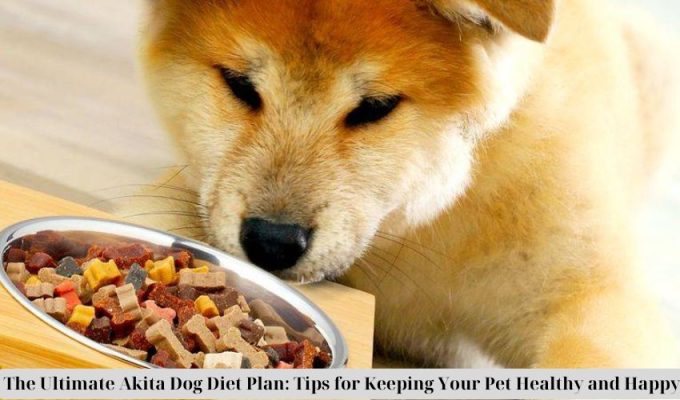Discover the best Akita Dog diet plan to keep your pet healthy and happy with these expert tips.
Introduction to the Akita Dog Diet Plan
The Akita Dog Diet Plan is a comprehensive guide to providing your Akita with the best nutrition for their health and longevity. This diet plan focuses on the benefits of feeding your Akita a raw food diet, which is considered the best food for this breed. The diet plan emphasizes the importance of species-appropriate nutrition, which includes high-quality protein, healthy fats, vitamins, minerals, and fibre from vegetables and berries.
Benefits of a Raw Food Diet for Akitas
– Prevents common health conditions such as obesity, joint, dental, and digestive issues
– Reduces allergy symptoms such as excessive itching and skin complaints
– Supports optimal digestion and nutrient absorption
– Promotes a healthy coat, skin, and overall appearance
Nutritional Requirements for Akitas
– Protein from quality meat sources
– Essential fatty acids and omegas
– Small amounts of carbohydrates from vegetables/herbs/berries
– Natural vitamins and minerals from bone and plant sources
– Hydration from high moisture foods and drinking water
The Akita Dog Diet Plan also addresses the importance of maintaining an appropriate healthy weight for your Akita and provides guidance on how to assess and monitor your dog’s weight. Additionally, the plan highlights the benefits of incorporating supplements to further enhance your dog’s nutrition and overall well-being.
Understanding the Nutritional Needs of Akita Dogs
Akita dogs have specific nutritional needs that must be met in order for them to thrive. As a large and powerful breed, Akitas require a diet rich in high-quality protein to support their muscle mass and overall health. Additionally, they need essential fatty acids and omegas to support their coat, skin, and overall well-being. It’s important to provide them with small amounts of carbohydrates from vegetables, herbs, and berries to ensure they receive fiber, prebiotics, and antioxidants that are lacking in meat alone.
Nutritional Requirements for Akitas
To meet the nutritional requirements of Akitas, their diet should consist of:
1. Protein from quality meat sources
2. Essential fatty acids and omegas
3. Small amounts of carbohydrates from vegetables, herbs, and berries
4. Natural vitamins and minerals from bone and plant sources
5. Hydration from high moisture foods and drinking water
It’s essential to ensure that the diet of an Akita is balanced and appropriate for their life stage and energy needs. This typically includes a combination of high-quality protein, healthy fats, vitamins, minerals, and fiber from vegetables and berries.
Incorporating ground bone in meals or providing recreational bones for enrichment adds nutrients that support digestion, skin and bone health, and mobility. Offal is known as a natural multivitamin for dogs due to the density of macronutrients and micronutrients, while veggies and some fruits offer a diversity of phytonutrients and other compounds that nourish the body’s cells, thereby supporting optimal health of the body’s vital systems and functions. Water is also essential for the proper functioning of a dog’s physiology, with a raw diet containing approximately 70% moisture to keep Akitas properly hydrated.

Choosing the Right Food for Your Akita Dog
When it comes to choosing the right food for your Akita, it’s essential to consider their unique dietary needs and preferences. Akita dogs thrive on a diet that is high in quality animal-based protein sources, such as beef, chicken, turkey, lamb, duck, eggs, and fish. Protein is a crucial nutrient for your Akita’s overall health, as it contributes to the optimal efficiency of all body cells, systems, and functions. Additionally, essential fatty acids and omegas, small amounts of carbohydrates from vegetables, natural vitamins and minerals from bone and plant sources, and hydration are also important components of a well-balanced Akita diet.
Nutritional Requirements of an Akita
– Protein from quality meat sources
– Essential fatty acids and omegas
– Small amounts of carbohydrates from vegetables/herbs/berries
– Natural vitamins and minerals from bone and plant sources
– Hydration from high moisture foods and drinking water
It’s important to ensure that your Akita’s diet includes these essential nutrients to support their overall health and well-being. Whether you choose to feed them a homemade raw food diet or opt for a pre-prepared raw dog food supplier like ProDog, it’s crucial to provide a diet that meets their specific nutritional requirements.
Choosing the Best Food for Your Akita
– Consider the canine anatomy and digestive system
– Opt for a natural, whole food diet
– Avoid high levels of starchy carbs found in kibble
– Ensure a balanced and appropriate diet for their life stage and energy needs
When choosing the best food for your Akita, it’s important to consider their anatomical and digestive needs. A natural, whole food diet that replicates their ancestral diet is ideal for promoting their overall health and longevity. Avoiding high levels of starchy carbs found in kibble and ensuring a balanced and appropriate diet for their life stage and energy needs are essential considerations when selecting the right food for your Akita.
Implementing a Feeding Schedule for Your Akita Dog
Implementing a Feeding Schedule for Your Akita Dog
When it comes to feeding your Akita, it’s important to establish a consistent feeding schedule. This helps regulate your dog’s digestion, maintain a healthy weight, and provide structure to their daily routine. A feeding schedule also allows you to monitor your dog’s appetite and make adjustments to their diet as needed.
To start, determine the appropriate number of meals for your Akita based on their age, activity level, and overall health. Puppies may require more frequent meals, while adult dogs can typically be fed twice a day. Once you have established the number of meals, choose specific times for feeding, and stick to this schedule as closely as possible.
When creating a feeding schedule for your Akita, consider their exercise routine. It’s best to feed your dog after they have had a chance to rest following physical activity. This helps prevent issues such as bloat, a potentially serious condition that can occur when a dog exercises immediately after eating.
In addition to regular meals, be mindful of treats and snacks. These should be factored into your dog’s overall daily calorie intake to prevent overfeeding. It’s important to choose healthy, natural treats that complement your Akita’s diet and provide additional nutrients.
By implementing a feeding schedule for your Akita, you can ensure they receive the proper nutrition and maintain a healthy lifestyle. This structured approach to feeding also allows you to monitor your dog’s appetite, weight, and overall well-being more effectively.
Supplementing Your Akita Dog’s Diet
Supplementing your Akita dog’s diet with the right vitamins and minerals can help ensure they are getting all the nutrients they need for optimal health. While a raw food diet provides many essential nutrients, adding supplements can further support your dog’s overall well-being.
Benefits of Supplements for Akita Dogs
– Supplements can provide additional support for joint health, especially important for large breeds like Akitas who may be prone to joint issues.
– Certain supplements can help support a healthy coat and skin, reducing itching and promoting a shiny, healthy coat.
– Adding probiotics to your dog’s diet can support their digestive health, promoting a healthy gut microbiome and reducing digestive issues.
Choosing the Right Supplements
When selecting supplements for your Akita, it’s important to choose high-quality products specifically designed for dogs. Look for supplements that are free from artificial additives and fillers, and consult with your veterinarian to determine which supplements are best suited to your dog’s individual needs.
By incorporating supplements into your Akita’s diet, you can enhance the benefits of their raw food meals and support their overall health and well-being.
Tips for Keeping Your Akita Dog Healthy and Happy
Akita dogs are known for their loyalty, intelligence, and strong protective instincts. To keep your Akita healthy and happy, it’s important to provide them with a balanced diet, regular exercise, and proper grooming. Additionally, socialization and training are essential for their mental and emotional well-being.
Regular Exercise
Akita dogs are a large and powerful breed that requires regular exercise to stay healthy and happy. Daily walks, playtime, and mental stimulation activities are important to keep them physically and mentally fit. Providing them with a secure and spacious outdoor area to roam and explore is also beneficial for their overall well-being.
Proper Grooming
Regular grooming is essential for maintaining the health and appearance of your Akita. Brushing their coat, trimming their nails, and cleaning their ears are important grooming tasks to keep them clean and comfortable. Additionally, regular dental care is crucial for their oral health.
Socialization and Training
Early socialization and obedience training are vital for Akita dogs. Proper socialization helps them become well-adjusted and confident around people and other animals. Obedience training helps in establishing a strong bond with your Akita and ensures they understand basic commands and behaviors.
Regular Veterinary Check-ups
Routine veterinary check-ups are important for monitoring your Akita’s overall health and detecting any potential health issues early on. Vaccinations, parasite control, and preventive care are essential for their well-being.
By following these tips and providing your Akita with love, care, and attention, you can ensure they lead a healthy and happy life.
Conclusion: The Ultimate Akita Dog Diet Plan
In conclusion, the ultimate diet plan for your Akita should consist of a natural, raw food diet that replicates what dogs evolved to eat in the wild. This includes a balanced combination of high-quality protein, healthy fats, vitamins, minerals, and fibre from vegetables and berries. By choosing a reputable supplier of pre-prepared raw dog food, you can ensure your Akita is receiving nutritionally balanced meals that will fuel their well-being and longevity.
Additionally, it is important to consider the nutritional requirements of your Akita, including the need for protein from quality meat sources, essential fatty acids and omegas, small amounts of carbohydrates from vegetables/herbs/berries, natural vitamins and minerals from bone and plant sources, and proper hydration. By selecting a diet with these key components, you can support the optimal health and performance of your Akita.
Furthermore, incorporating supplements into your Akita’s diet can take their nutrition to the next level, providing preventative support against Akita-related conditions and addressing any individual needs they may have at different life stages. By combining a natural, raw food diet with the best dog supplements, you can ensure that your Akita thrives and enjoys a healthy, happy life.
In conclusion, a well-balanced diet is essential for the health and well-being of Akita Dogs. Consult with a veterinarian to create a diet plan that meets their nutritional needs, and consider incorporating high-quality proteins, healthy fats, and complex carbohydrates for optimal health.




